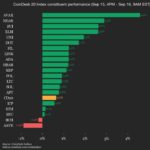The digital banking landscape is shifting as Openbank, the online banking arm of Spanish banking giant Santander Group, strides into the cryptocurrency arena. Recently, the bank launched a cryptocurrency trading service for its customers in Germany, with plans to extend this offering to the Spanish market soon. This strategic move signifies a growing acceptance of digital currencies among traditional financial institutions and aims to meet the rising demand from customers eager to invest in cryptocurrency.
Customers can now buy, sell, and hold five of the most popular cryptocurrencies—Bitcoin (BTC), Ether (ETH), Litecoin (LTC), Polygon (MATIC), and Cardano (ADA)—all within the platform that also supports stocks, ETFs, and investment funds. By allowing transactions without the need to transfer funds to an external platform, Openbank is simplifying the investment process for its users, keeping their assets safely managed under Santander’s extensive umbrella.
“By incorporating the main cryptocurrencies into our investment platform, we are responding to the demand of some of our customers,” stated Coty de Monteverde, head of crypto at Grupo Santander.
The bank has outlined a transaction fee of 1.49% on trades, with a minimum cost of 1 euro (approximately $1.2), and notably, it does not impose custody fees. Looking towards the future, Openbank plans to diversify its offerings further by adding more cryptocurrencies and enhancing user features, including the introduction of crypto-to-crypto conversions.
This venture into cryptocurrency trading follows Santander Private Bank’s earlier initiatives in 2023, which allowed clients in Switzerland to trade Bitcoin and Ether, highlighting the bank’s ongoing commitment to integrating digital assets into its services. Moreover, Santander has partnered with crypto safekeeping technology firm Taurus to ensure the security of these digital assets, demonstrating a proactive approach to safeguarding investments in an increasingly digital financial landscape.

Openbank Expands Cryptocurrency Services
The digital banking arm of Santander Group, Openbank, introduces cryptocurrency trading services for customers in Germany.
- Launch of Cryptocurrency Trading:
- Openbank allows users to buy, sell, and hold five cryptocurrencies: BTC, ETH, LTC, MATIC, and ADA.
- Service set to expand to Spain in the near future.
- Integrated Trading Platform:
- Customers can manage cryptocurrencies alongside stocks, ETFs, and investment funds.
- Elimination of the need to transfer funds to external platforms for trading.
- Transaction Fee Structure:
- A 1.49% fee applies per transaction, with a minimum fee of 1 euro ($1.2).
- No additional custody fees for holding cryptocurrencies.
- Future Enhancements Planned:
- Openbank aims to add more cryptocurrencies and features such as crypto-to-crypto conversions.
- Response to customer demand for diverse investment options.
- Previous Initiatives:
- Santander Private Bank previously allowed Swiss clients to trade BTC and ETH.
- Collaboration with Taurus for crypto safekeeping technology.
This development may impact readers by providing easier access to cryptocurrency investments without needing to use multiple platforms, thus simplifying their investment management.
Openbank’s Entry into Cryptocurrency Trading: Competitive Landscape and Implications
The recent move by Openbank, Santander Group’s digital banking arm, to launch cryptocurrency trading services in Germany marks a significant entry into the competitive world of digital finance. By allowing customers to buy, sell, and hold major cryptocurrencies directly within its platform—alongside traditional investment options like stocks and ETFs—Openbank is positioning itself to capture the growing interest in crypto assets among traditional investors.
Competitive Advantages: One of Openbank’s primary advantages is the seamless integration of cryptocurrency trading with existing banking services, enabling users to manage all their investments in a single platform. This feature serves as a substantial draw for existing Santander customers who are looking for a simple way to diversify their portfolios without the hassle of navigating third-party exchanges. The bank’s established reputation and regulatory compliance add a layer of trust that many digital-native platforms struggle to achieve, potentially attracting users hesitant about the crypto space.
In comparison to competitors like Revolut or Coinbase, which focus exclusively on crypto trading or have a broader fintech approach, Openbank’s traditional banking pedigree may appeal to customers seeking stability and security in their investments. Furthermore, the bank’s competitive transaction fee of 1.49% is in line with industry standards, catering to users who are price-sensitive yet eager to enter the cryptocurrency market.
Disadvantages and Challenges: However, Openbank’s entrance into this landscape is not without its challenges. The platform’s current limitations, such as the restricted selection of cryptocurrencies and the absence of advanced trading features common on dedicated platforms, could impede its competitiveness. Additionally, as market dynamics evolve, Openbank will need to continuously enhance its offerings to keep pace with rapid advancements in cryptocurrency technology and trading methodologies. The planned introduction of additional features, such as crypto-to-crypto conversions, will be pivotal in attracting a more sophisticated clientele who desires more flexibility in their trading options.
The target audience for Openbank’s service largely consists of traditional investors looking to dip their toes into crypto without the complexities of separate platforms, potentially benefiting those already familiar with Santander’s banking services. Conversely, this could create problems for niche cryptocurrency exchanges that thrive on providing specialized services, as Openbank’s simplicity and integration might draw away customers who prefer comprehensive trading environments offered elsewhere.













